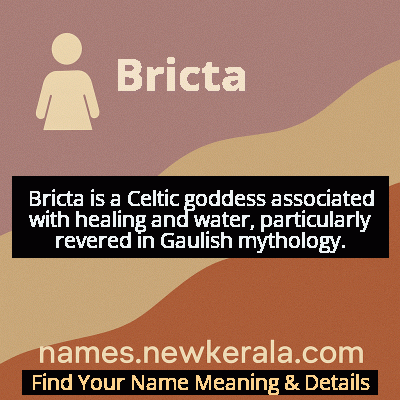Bricta Name Meaning & Details
Origin, Popularity, Numerology Analysis & Name Meaning of Bricta
Discover the origin, meaning, and cultural significance of the name BRICTA. Delve into its historical roots and explore the lasting impact it has had on communities and traditions.
Name
Bricta
Gender
Female
Origin
Celtic
Lucky Number
8
Meaning of the Name - Bricta
Bricta is a Celtic goddess associated with healing and water, particularly revered in Gaulish mythology.
Bricta - Complete Numerology Analysis
Your Numerology Number
Based on Pythagorean Numerology System
Ruling Planet
Saturn
Positive Nature
Ambitious, efficient, realistic, and authoritative.
Negative Traits
Materialistic, stressed, confrontational, and can be overly ambitious.
Lucky Colours
Dark blue, black.
Lucky Days
Saturday.
Lucky Stones
Blue sapphire, amethyst.
Harmony Numbers
2, 4, 6.
Best Suited Professions
Business leaders, managers, financial services, law enforcement.
What People Like About You
Leadership, determination, organizational skills.
Famous People Named Bricta
Bricta
Celtic Goddess
Ancient deity of healing springs worshipped in eastern Gaul
Bricta of Luxeuil
Religious Figure
Early medieval figure bridging pagan and Christian healing traditions
Bricta the Healer
Folkloric Character
Legendary wise woman in regional folklore with medicinal knowledge
Name Variations & International Equivalents
Click on blue names to explore their detailed meanings. Gray names with will be available soon.
Cultural & Historical Significance
Extended Personality Analysis
Those bearing the name Bricta are often characterized by a profound connection to nurturing and healing energies, mirroring the attributes of their namesake goddess. They typically exhibit exceptional empathy and intuition, able to sense emotional undercurrents and provide comfort where it's most needed. Their presence often has a calming effect on others, much like the soothing waters associated with the original deity. Brictas tend to be deeply reflective individuals who value authenticity and emotional honesty in their relationships. They often serve as emotional anchors for their friends and family, offering wisdom and support during times of crisis or transition. While generally gentle in demeanor, they possess an inner strength that enables them to withstand significant challenges without losing their compassionate nature. This resilience stems from their connection to the cyclical nature of healing and regeneration that their name symbolizes. Brictas are frequently drawn to creative expression, particularly forms that allow them to explore themes of transformation, nature, and emotional depth. They make excellent counselors, healers, artists, and environmental advocates, roles that allow them to channel their innate gifts for understanding, restoration, and creating harmony between people and their environments.
Modern Usage & Popularity
In contemporary naming practices, Bricta occupies a unique niche as an archaeologically attested but rarely used Celtic name. Its modern usage is primarily confined to families with strong interest in Celtic heritage, mythology, or pagan traditions. The name appeals to parents seeking distinctive names with historical authenticity and spiritual resonance. While statistically insignificant in national naming databases, Bricta has seen a slight increase in usage coinciding with broader trends favoring mythological and nature-inspired names. Its rarity makes it particularly attractive to parents wanting to avoid popular names while still choosing something with cultural depth and meaningful associations. Modern Brictas often find themselves explaining the origin and pronunciation of their name, which can foster interesting conversations about Celtic history and mythology. The name's connection to healing and water resonates with contemporary environmental consciousness and interest in holistic wellness practices. Some parents specifically choose Bricta for its feminine strength associations and its link to pre-Christian European spirituality, seeing it as a way to honor ancestral traditions while giving their daughter a unique identity rooted in ancient cultural heritage.
Symbolic & Spiritual Meanings
The symbolic resonance of Bricta extends beyond its literal association with healing waters to encompass broader themes of transformation, intuition, and natural wisdom. As a name connected to therapeutic springs, it symbolizes the idea that healing often emerges from hidden sources and requires both time and the right conditions to manifest. This mirrors the way underground aquifers gradually filter and purify water before it emerges as life-giving springs. Symbolically, Bricta represents the concept that true strength often appears as gentle persistence rather than forceful action—much like water that shapes stone through patient, continuous flow. The name also carries connotations of emotional and spiritual purification, suggesting a capacity to help others release what no longer serves them and embrace renewal. In psychological terms, Bricta symbolizes the integration of conscious and unconscious knowledge, representing the wisdom that bubbles up from deeper layers of understanding. For those drawn to the name, it often signifies a connection to cyclical processes of death and rebirth, healing and transformation, making it particularly meaningful for individuals navigating significant life changes or working in healing professions.

